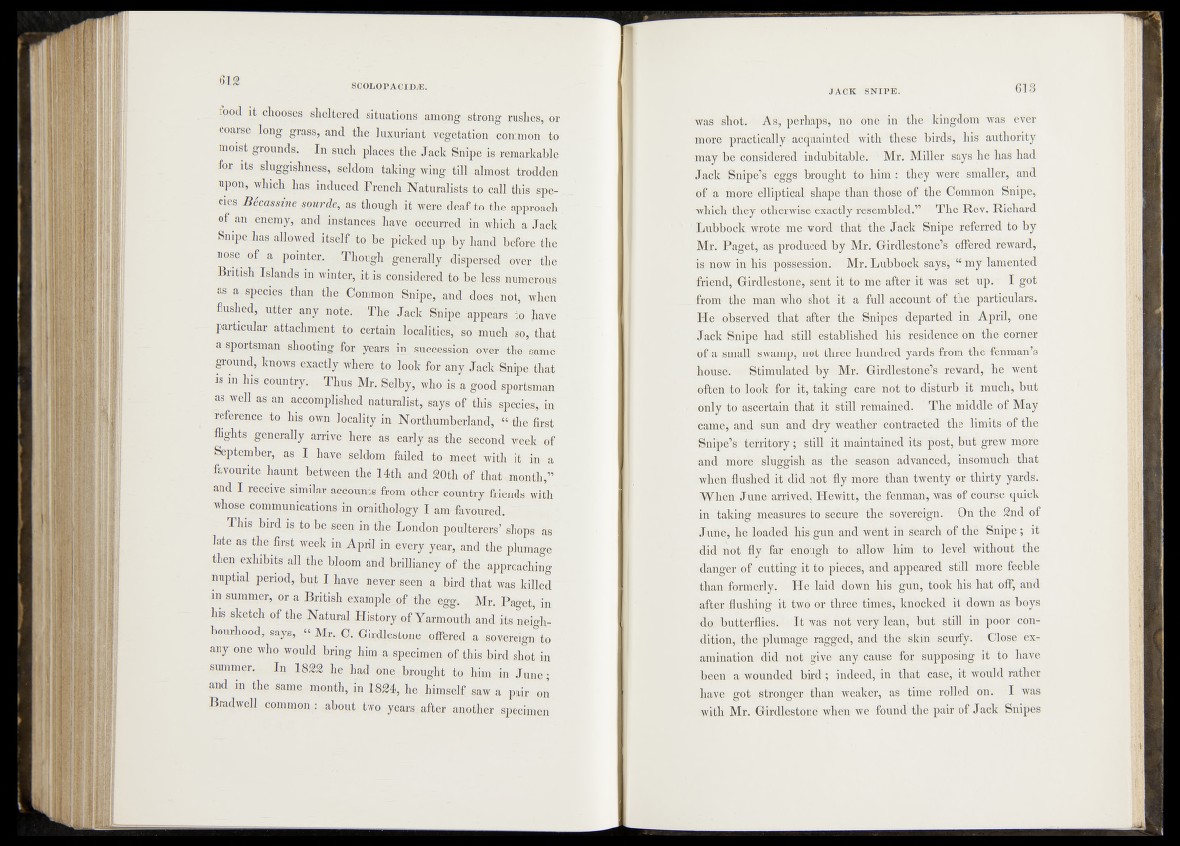
fpod it chooses sheltered situations among strong rushes, or
coarse long grass, and the luxuriant vegetation, common, to
moist grounds. In such places-the Jack Snipe is remarkable
for its sluggishness, seldom taking wing till almost trodden
upon, which has induced French Naturalists to call this 85-
cies Bécassine sourde, as though it were deaf to the approach
of an enemy, and instances have occurred in which, a Jack
Snipehas allowed itself to be picked up by hand before the
nose of a pointer,* Though generally dispersed over the
British Islands in winter, it is considered to be less numerous
as a species than the Common Snipe, and does not, , when
flushed, utter any note. The Jack Snipe appears to have
particular attachment to certain localities, sq.- much so,- that
a sportsman shooting for -years in succession over" the same
ground, knows exactly where to look for any Jack-Snipe, that
is in his country. Thus Mr. Sejby, who-is a good sportsman
as well as an accomplished naturalist, says of this species, in
"reference to his own locality in Northumberland, “ the first
flights generally arrive here as early as the second week, of
September, as I have seldom failed to meet with it in-a
favourite haunt between the 14th and 20th of thaMronth,’’
and I receive similar accounts from other country friends with
whose communications in ornithology I am favoured. ~
This bird is to be seen in the London poulterers’ shops as
late as the first week in April in every, year, and the plumage
them exhibits all the bloom and brilliancy gjl the approaching
nuptial period, but I have never seen a bird that was killed
m summer, or a British examplejff the egg. Mr. Paget, in
his sketch of the Natural History of Yarmouth and its neighbourhood,
says, « Mr. 0 . Girdlestone offered a sovereign to
any one who would bring him a specimen of this bird shot in
summer. In 1822 he had one.brought to him.rin June;
and in the same month, in 1824, he himself saw a pair on
Bradwell common : about two years after another specimen
was shot. As, perhaps, no one in the kingdom was ever
more practically acqh&intedbMtlr these birds, his authority
may be considered indubitable* ‘ Mr. Miller says he has had
•Jack Snipe’s -eggs' brought to h im : they were smaller, and
of a more elliptical shape than those of the Common Snipe,
which they otherwise exactly resembled.” The Rev, Richard
Lubbock, wrote me word that* tfi§ Jack Snipe referred to by
Mr. Paget,,, as produced by Mr. Girdlesibne’s offered reward,
i%now in his 'possession.-. 1‘Mr. Lubbock says?- -u*my lamented
friend, Girdlestone, sent it to me after it was set up. I got
from the man who sfshot it a 1 full account ofBhe particulars.
He* observed that after the Snipes departed in April, one
Jack -Snipe had still established his residence bn the corner
of a small swampy not three hundred yards from the fenmanrs
house. ■ Stimulated by Mr. Girdlestone’s reward, he went
oftemfo look ? for it, taking care not to disturb'it much, but
only to ascertain that it Still rehiained. The middle of May
caine, and sun' and dry weather contracted the limits of the
Snipe’s- feriitory^still it maintained its pbst,. bht. grew more
and more sluggish' as the season advanced, insomuch that
when flushed it did-not fly more than twenty or thirty yards.
When June arrived, Hewitt, the fenman, was of course quick
in taking measures to secure the sovereign. On the 2nd of
June, he loaded his gun and went in search of the Snipe; it
did not fly far enough to- allow him to level without the
danger of cutting it to pieces, and appeared still more feeble
than, formerly. He laid down his gun, took his hat off, and
after flushing it two or three times, knocked it down as boys
dp. butterflies. It was not very lean, but still in poor condition,
the plumage ragged, and the skin scurfy. Close examination
did not/give any cause for supposing it to have
been a wounded bird ; indeed, in that case, it would, rather
have got stronger than weaker, as time rolled on. I was
with Mr. Girdlestone when we found the pair of Jack Snipes